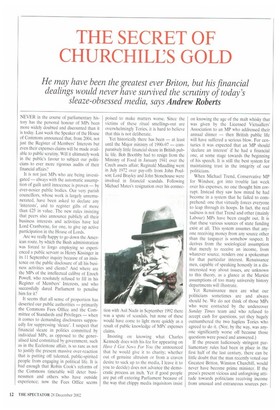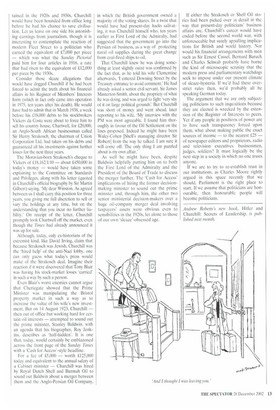THE SECRET OF CHURCHILES GOLD
He may have been the greatest ever Briton, but his financial dealings would never have survived the scrutiny of today's
sleaze-obsessed media, says Andrew Roberts
NEVER in the course of parliamentary history has the personal honour of MPs been more widely doubted and discounted than it is today. Last week the Speaker of the House of Commons announced that, from 2004, not just the Register of Members' Interests but even their expenses claims will be made available to public scrutiny. Will it ultimately work in the public's favour to subject our politicians to ever more rigorous audits of their financial affairs?
It is not just MPs who are being investigated — always with the automatic assumption of guilt until innocence is proven — by ever-nosier public bodies. Our very parish councillors, whose work is largely unremunerated, have been asked to declare any 'interests', and to register gifts of more than £25 in value. The new rules insisting that peers also announce publicly all their business interests and activities have led Lord Cranborne, for one, to give up active participation in the House of Lords.
Are we really happy to go down the American route, by which the Bush administration was forced to forgo employing so experienced a public servant as Henry Kissinger in its 11 September inquiry because of an insistence on the public disclosure of all his business activities and clients? And where are the MPs of the intellectual calibre of Enoch Powell, who resolutely refused to fill in his Register of Members' Interests, and who successfully dared Parliament to penalise him for it?
It seems that all sense of proportion has deserted our public authorities — primarily the Commons Fees Office and the Committee of Standards and Privileges — when it comes to demanding disclosures supposedly for suppressing 'sleaze'. I suspect that financial sleaze in politics committed by individual MPs, as opposed to the generalised kind committed by government, such as in the Ecclestone affair, is so rare as not to justify the present massive over-reaction that is putting off talented, public-spirited people from engaging in political life. It is bad enough that Robin Cook's reforms of the Commons timetable will deter businessmen and others who have outside experience; now the Fees Office seems
poised to make matters worse. Since the victims of these ritual smellings-out are overwhelmingly Tories, it is hard to believe that this is not deliberate.
Yet historically there has been — at least until the Major ministry of 1990-97 — comparatively little financial sleaze in British public life. Bob Boothby had to resign from the Ministry of Food in January 1941 over the Czech assets affair; Reginald Maudling went in July 1972 over pay-offs from John Poulson; Lord Brayley and John Stonehouse were involved in financial scandals. Following Michael Mates's resignation over his connec tion with Asil Nadir in September 1992 there was a spate of scandals, but none of these would have come to light more quickly as a result of public knowledge of MPs' expenses claims.
Insisting on knowing what Charles Kennedy does with his fee for appearing on Have I Got News For You (he announced that he would give it to charity; whether out of genuine altruism or from a craven desire to suck up to the media, I leave it to you to decide) does not advance the democratic process an inch. Yet if good people are put off entering Parliament because of the way that chippy media inquisitors insist on knowing the age of the malt whisky that was given by the Licensed Victuallers' Association to an MP who addressed their annual dinner — then British public life will have suffered a serious blow. For centuries it was expected that an MP should 'declare an interest' if he had a financial one, at some stage towards the beginning of his speech. It is still the best system for maintaining trust in the integrity of our politicians.
When Michael Trend, Conservative MP for Windsor, got into trouble last week over his expenses, no one thought him corrupt. Instead they saw how mired he had become in a system that he failed to comprehend: one that virtually forces everyone to leap through its hoops. In fact, the real sadness is not that Trend and other (mainly Labour) MPs have been caught out. It is that these various sources of state funding exist at all. This system assumes that anyone receiving money from any source other than the taxpayer is somehow suspect. It derives from the sociological assumption that merely to receive an income, from whatever source, renders one a spokesman for that particular interest. Renaissance men, capable of speaking honestly in a disinterested way about issues, are unknown to this theory, as a glance at the Marxist assumptions of too many university history departments will illustrate.
Yet Renaissance men are what our politicians sometimes are and always should be. We do not think of those MPs who were contacted by the undercover Sunday Times team and who refused to accept cash for questions, yet they hugely outnumbered the two hapless Tories who agreed to do it. (Nor, by the way, was anyone significantly worse off because those questions were posed and answered.) If the present ludicrously stringent parliamentary rules had been in place in the first half of the last century, there can be little doubt that the man recently voted our Greatest Briton, Winston Churchill, would never have become prime minister. If the press's present vicious and unforgiving attitude towards politicians receiving income from unusual and extraneous sources per
tamed in the 1920s and 1930s, Churchill would have been hounded from office long before he had his chance to save civilisation. Let us leave on one side his astonishing earnings from journalism, though it is interesting to contemplate the reaction of modern Fleet Street to a politician who earned the equivalent of £7,000 per piece — which was what the Sunday Pictorial paid him for four articles in 1916, a rate that had risen to the equivalent of £12,000 per piece by the 1930s.
Consider those sleaze allegations that would have dogged Churchill if he had been forced to admit the truth about his financial affairs in his Register of Members' Interests form (which in fact only came into operation in 1975, ten years after his death). He would have had to admit that in March 1938, a week before his £18.000 debts to his stockbrokers Vickers da Costa were about to force him to sell his country house, Chartwell, for £20,000, an Anglo-South African businessman called Sir Henry Strakosch, the chairman of Union Corporation Ltd. had taken on his debts and guaranteed all his investments against further losses for the next three years.
The Moravian-born Strakosch's cheque to Vickers of £18,162/1/10 — about 1450,000 in today's money — would have taken some explaining to the Committee on Standards and Privileges, along with his letter (quoted in Churchill's official biography by Sir Martin Gilbert) saying. 'My dear Winston, As agreed between us I shall carry this position for three years, you giving me full discretion to sell or vary the holdings at any time, but on the understanding that you incur no further liability.' On receipt of the letter, Churchill promptly took Chartwell off the market, even though the Times had already announced it was up for sale.
Although, today, only ex-historians of the extremist kind, like David Irving, claim that because Strakosch was Jewish, Churchill was the 'hired help' of the anti-Nazi lobby, one can only guess what today's press would make of the Strakosch deal. Imagine their reaction if it were discovered that Tony Blair was having his stock-market losses 'carried' in such a way by such a person.
Even Blair's worst enemies cannot argue that Cheriegate showed that the Prime Minister was manipulating the Bristol property market in such a way as to increase the value of his wife's new investment. But on 14 August 1923, Churchill — then out of office but working hard for certain oil interests — attempted to sound out the prime minister, Stanley Baldwin, with an agenda that his biographer, Roy Jenkins, describes as 'half-hidden'. It is one that, today, would certainly be emblazoned across the front page of the Sunday Times with a 'Cash for Access'-style headline.
For a fee of £5,000 — worth £125,000 today and equivalent to the annual salary of a Cabinet minister — Churchill was hired by Royal Dutch Shell and Burmah Oil to sound out Baldwin about a merger between them and the Anglo-Persian Oil Company, in which the British government owned a majority of the voting shares. In a twist that would have had present-day hacks salivating, it was Churchill himself who, ten years earlier as First Lord of the Admiralty, had suggested that the government go into the Persian oil business, as a way of protecting naval oil supplies during the great change from coal-fired ships to oil.
That Churchill knew he was doing something at least slightly outré was confirmed by the fact that, as he told his wife Clementine afterwards, 'I entered Downing Street by the Treasury entrance to avoid comment.' He had already asked a senior civil servant. Sir James Masterton-Smith, about the propriety of what he was doing, and was urged to fight 'very shy of it on large political grounds'. But Churchill was short of money and went ahead, later reporting to his wife, 'My interview with the PM was most agreeable. I found him thoroughly in favour of the Oil Settlement on the lines proposed. Indeed he might have been Waley-Cohen [Shell's managing director Sir Robert] from the way he talked. I am sure it will come off. The only thing I am puzzled about is my own affair.'
As well he might have been, despite Baldwin helpfully putting him on to both the First Lord of the Admiralty and the President of the Board of Trade to discuss the merger further. The 'Cash for Access' implications of hiring the former decisionmaking minister to sound out the prime minister and, through him, the other two senior ministerial decision-makers over a huge oil-company merger deal involving taxpayers' assets were obvious even to sensibilities in the 1920s, let alone to those of our own `sleaze'-obsessed age. If either the Strakosch or Shell Oil stories had been picked over in detail in the way that present-day politicians' business affairs are, Churchill's career would have ended before the second world war, with unforeseeable but surely appalling implications for British and world history. Nor would his financial arrangements with men such as Sir Ernest Cassel, Bernard Baruch and Charles Schwab probably have borne the kind of microscopic scrutiny that the modern press and parliamentary watchdogs seek to impose under our present climate of sleaze-hysteria. If we'd had these overstrict rules then, we'd probably all be speaking German today.
The argument that we are only subjecting politicians to such inquisitions because they are elected is wrecked by the extension of the Register of Interests to peers. Yet if any people in positions of power are to have such transparency forced upon them, what about making public the exact sources of income — to the nearest £25 — of newspaper editors and proprietors, radio and television executives, businessmen, judges, soldiers? It must logically be the next step in a society in which no one trusts anyone.
If we are to try to re-establish trust in our institutions, as Charles Moore rightly argued in this space recently that we should, Parliament is the right place to start. If we assume that politicians are honourable, then honourable people will become politicians.
Andrew Roberts's new book, Hitler and Churchill: Secrets of Leadership, is published next month.



























































 Previous page
Previous page